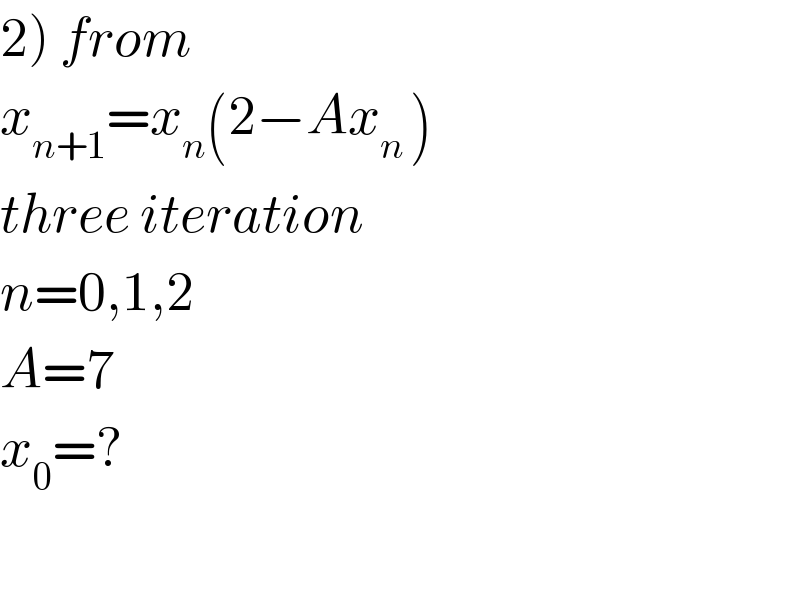Question Number 53161 by peter frank last updated on 18/Jan/19

Answered by peter frank last updated on 18/Jan/19
![from x_(n+1 ) =(1/r)[(r−1)x_n +Ax_(n ) ^(1−r) ] three iteration n=0,1,2 A=10 x_0 =2.0](https://www.tinkutara.com/question/Q53169.png)
$${from} \\ $$$${x}_{{n}+\mathrm{1}\:} =\frac{\mathrm{1}}{{r}}\left[\left({r}−\mathrm{1}\right){x}_{{n}} +{Ax}_{{n}\:} ^{\mathrm{1}−{r}} \right] \\ $$$${three}\:{iteration} \\ $$$${n}=\mathrm{0},\mathrm{1},\mathrm{2} \\ $$$${A}=\mathrm{10} \\ $$$${x}_{\mathrm{0}} =\mathrm{2}.\mathrm{0} \\ $$$$ \\ $$
Answered by peter frank last updated on 18/Jan/19

$$\left.\mathrm{2}\right)\:{from} \\ $$$${x}_{{n}+\mathrm{1}} ={x}_{{n}} \left(\mathrm{2}−{Ax}_{{n}\:} \right) \\ $$$${three}\:{iteration} \\ $$$${n}=\mathrm{0},\mathrm{1},\mathrm{2} \\ $$$${A}=\mathrm{7} \\ $$$${x}_{\mathrm{0}} =? \\ $$$$ \\ $$
Answered by peter frank last updated on 18/Jan/19
![i)fog[oh(x)]=[fog]oh(x) fog(x)=f[g(x)] gof (x)=g[f(x)] ii)find fogoh(x)] and then interchange to get inverse](https://www.tinkutara.com/question/Q53182.png)
$$\left.{i}\right){fog}\left[{oh}\left({x}\right)\right]=\left[{fog}\right]{oh}\left({x}\right) \\ $$$${fog}\left({x}\right)={f}\left[{g}\left({x}\right)\right] \\ $$$${gof}\:\left({x}\right)={g}\left[{f}\left({x}\right)\right] \\ $$$$ \\ $$$$\left.{ii}\right){find}\: \\ $$$$\left.{fogoh}\left({x}\right)\right]\:{and}\:{then}\:{interchange} \\ $$$${to}\:{get}\:{inverse} \\ $$
